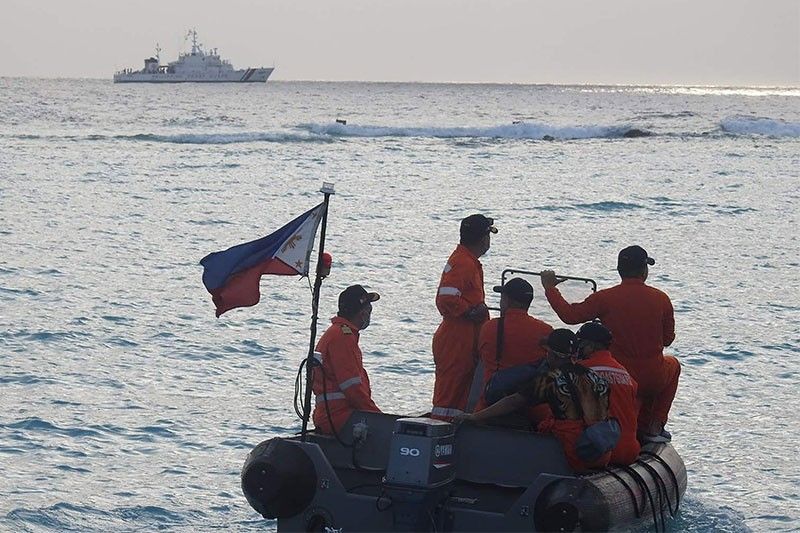SC rules Arroyo-era joint exploration with China, Vietnam unconstitutional

MANILA, Philippines — The Supreme Court declared the Tripartite Agreement for Joint Marine Seismic Undertaking (JMSU) among companies from China, Vietnam and Philippines — signed by the administration of then-President Gloria Macapagal-Arroyo — as unconstitutional and void.
Voting 12-2-1 on Tuesday, the SC en banc held that the JMSU by and among China National Offshore Oil Corporation (CNOOC), Vietnam Oil and Gas Corporation (PETROVIETNAM), and the Philippine National Oil Company that covers 142,886 square meters in the South China Sea is uncoinstitutional.
"The Court ruled that the JSMU is unconstitutional for allowing wholly-owned foreign corporations to participate in the exploration of the country’s natural resources without observing the safeguards provided in Section 2, Article XII of the 1987 Constitution," the statement from the SC Public Information Office read.
Part of the cited provision read:
All lands of the public domain, waters, minerals, coal, petroleum, and other mineral oils, all forces of potential energy, fisheries, forests or timber, wildlife, flora and fauna, and other natural resources are owned by the State. With the exception of agricultural lands, all other natural resources shall not be alienated. The exploration, development, and utilization of natural resources shall be under the full control and supervision of the State.
This puts to a close a nearly 15-year-old petition for certiorari filed by then-Reps. Satur Ocampo and Teodoro Casiño (Bayan Muna). The case was deemed submitted for decision in January 2010 but it took another 12 years for the SC to rule on it.
In a tweet, former Rep. Carlos Isagani Zarate (Bayan Muna) called the ruling a win for Philippine sovereignty. "Bayan Muna filed this petition as far back as 2008 as China has been using JMSU as cover in its unbridled exploration and incursion in our territory, particularly in the West Philippine Sea," he said.
According to an earlier STAR report, the MSU, the Philippines, China and Vietnam, through their respective oil corporations, agreed to conduct joint explorations on the disputed waters even if up to 80% of the JMSU site is within the Philippines’ 200-mile exclusive economic zone.
The JMSU expired in July 2008, but the petitioners have, since then, reiterated that the issues raised in the agreement continue to haunt the Philippines.
The respondent, meanwhile, said that Section 2, Article XII of the Constitution was inapplicable in the case as it supposedly only covers exploration, development and utilization of natural resources and not pre-exploration activities, which the JMSU covers.
But the Court noted that "exploration" refers to "a search or discovery of something," and held that the assailed agreement involves the exploration of the country’s natural resources, particularly petroleum.
The SC also pointed out that the text of a clause of the JMSU that states that the Parties “expressed desire to engage in a joint research of petroleum resource potential of a certain area of the South China Sea as a pre-exploration activity,” means that the agreement was executed to determine if petroleum exists in the area.
"That the Parties designated the joint research as a ‘pre-exploration activity’ is of no moment," the SC PIO, quoting the ruling by the high court, said. It added: "Such designation does not detract from the fact that the intent and aim of the agreement is to discover petroleum which is tantamount to 'exploration.'"
Associate Justice Samuel Gaerlan penned the ruling, with concurrences from Chief Justice Alexander Gesmundo and 10 other justices. Meanwhile, Associate Justices Amy Lazaro-Javier and Rodil Zalameda dissented. Associate Justice Ramon Paul Hernando took no part as he was on leave.
Reed Bank
The Philippines won a historic arbitral award in 2016 that invalidates China’s so-called nine-dash-line claims over much of the South China Sea and provides that some of the areas are within the Philippines’ exclusive economic zone (EEZ) and continental shelf.
Part of the EEZ is the Reed Bank, which reportedly has about 21 percent more gas than the reserves in Malampaya and is one of the two areas being eyed as sites of joint exploration between the Philippines and China.
In July 2022, former SC Senior Associate Justice Antonio Carpio urged President Ferdinand "Bongbong" Marcos Jr. to be firm when dealing with China to ensure that the ruling is enforced as China has long ignored it and the previous administration was "in severe deficit when dealing with China."
Marcos, who went on a state visit to Beijing this month, has said the Philippines is willing to go back to talks on joint oil exploration in the West Philippine Sea, a proposal floated sincde last year.— with reports from Kaycee Valmonte
- Latest
- Trending


































